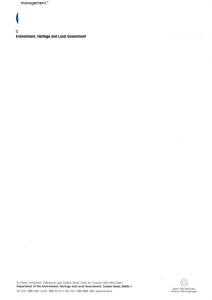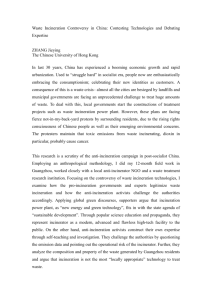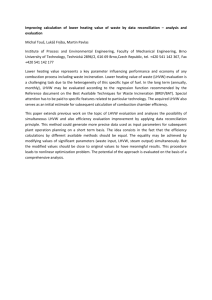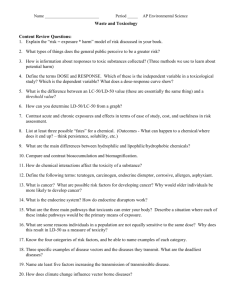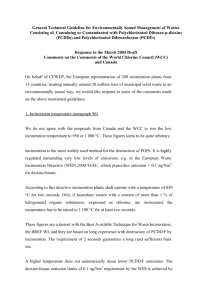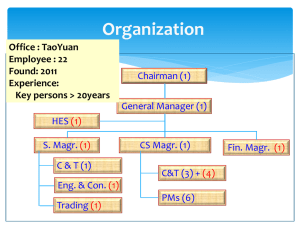Waste Incineration Complaint to EU Commission
advertisement
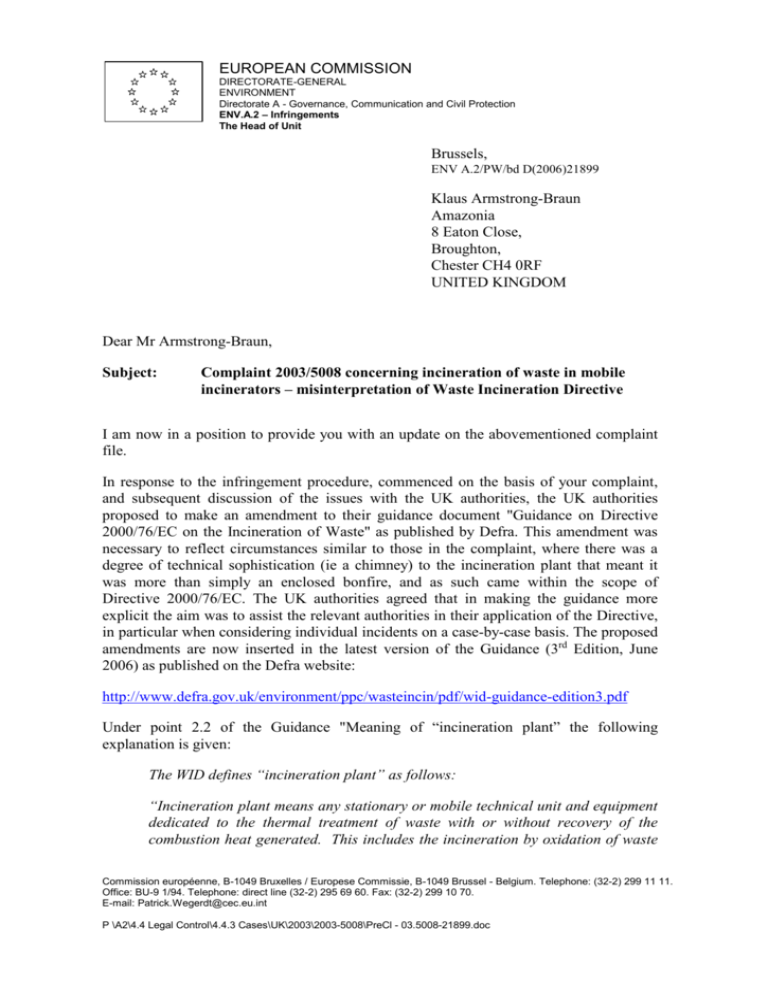
EUROPEAN COMMISSION DIRECTORATE-GENERAL ENVIRONMENT Directorate A - Governance, Communication and Civil Protection ENV.A.2 – Infringements The Head of Unit Brussels, ENV A.2/PW/bd D(2006)21899 Klaus Armstrong-Braun Amazonia 8 Eaton Close, Broughton, Chester CH4 0RF UNITED KINGDOM Dear Mr Armstrong-Braun, Subject: Complaint 2003/5008 concerning incineration of waste in mobile incinerators – misinterpretation of Waste Incineration Directive I am now in a position to provide you with an update on the abovementioned complaint file. In response to the infringement procedure, commenced on the basis of your complaint, and subsequent discussion of the issues with the UK authorities, the UK authorities proposed to make an amendment to their guidance document "Guidance on Directive 2000/76/EC on the Incineration of Waste" as published by Defra. This amendment was necessary to reflect circumstances similar to those in the complaint, where there was a degree of technical sophistication (ie a chimney) to the incineration plant that meant it was more than simply an enclosed bonfire, and as such came within the scope of Directive 2000/76/EC. The UK authorities agreed that in making the guidance more explicit the aim was to assist the relevant authorities in their application of the Directive, in particular when considering individual incidents on a case-by-case basis. The proposed amendments are now inserted in the latest version of the Guidance (3rd Edition, June 2006) as published on the Defra website: http://www.defra.gov.uk/environment/ppc/wasteincin/pdf/wid-guidance-edition3.pdf Under point 2.2 of the Guidance "Meaning of “incineration plant” the following explanation is given: The WID defines “incineration plant” as follows: “Incineration plant means any stationary or mobile technical unit and equipment dedicated to the thermal treatment of waste with or without recovery of the combustion heat generated. This includes the incineration by oxidation of waste Commission européenne, B-1049 Bruxelles / Europese Commissie, B-1049 Brussel - Belgium. Telephone: (32-2) 299 11 11. Office: BU-9 1/94. Telephone: direct line (32-2) 295 69 60. Fax: (32-2) 299 10 70. E-mail: Patrick.Wegerdt@cec.eu.int P \A2\4.4 Legal Control\4.4.3 Cases\UK\2003\2003-5008\PreCl - 03.5008-21899.doc as well as other thermal treatment processes such as pyrolysis, gasification or plasma processes insofar as the substances resulting from the treatment are subsequently incinerated.” […] The definition implies that an “incineration plant” will have a degree of technical sophistication. There is a diversity of devices in which waste is burnt, and regulators must therefore consider each type of device on a case-by-case basis to assess whether it may be “incineration plant” for the purposes of the WID. A device which does nothing more than provide physical containment for what would otherwise be an open bonfire lacks the necessary degree of technical sophistication. But devices providing more than that – for example, fan assisted air flow controls – may be “incineration plant” for the purposes of the WID. [my emphasis] On the basis of this clear reference in the Guidance on the application of the Directive in the UK, we are of the view that the necessary measures have been undertaken to ensure that incineration of the type raised in your complaint may be addressed by the provisions of Directive 2000/76/EC. In light of this assessment, I will be proposing to close this complaint file at the forthcoming meeting of the Commission. This proposed course of action is however subject to any comments you may have. I would be grateful if you could provide these within one month of your receipt of this letter so that account can be taken of them before a final decision is taken. Yours sincerely, Julio García Burgués Head of Unit 2
